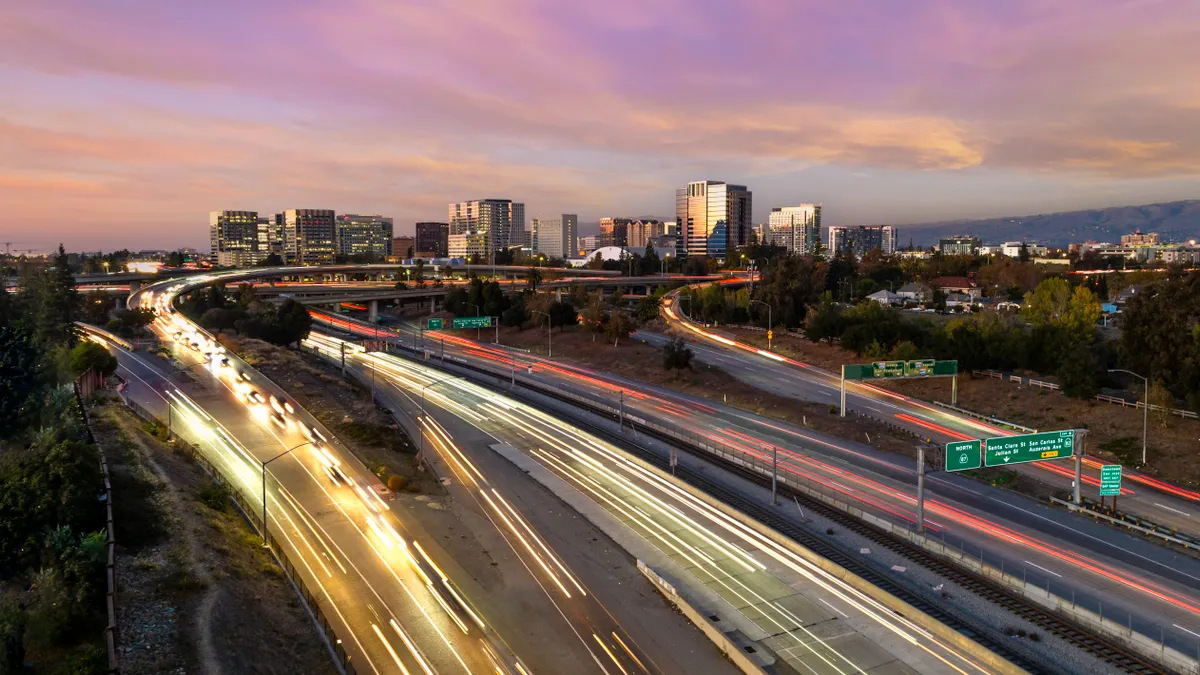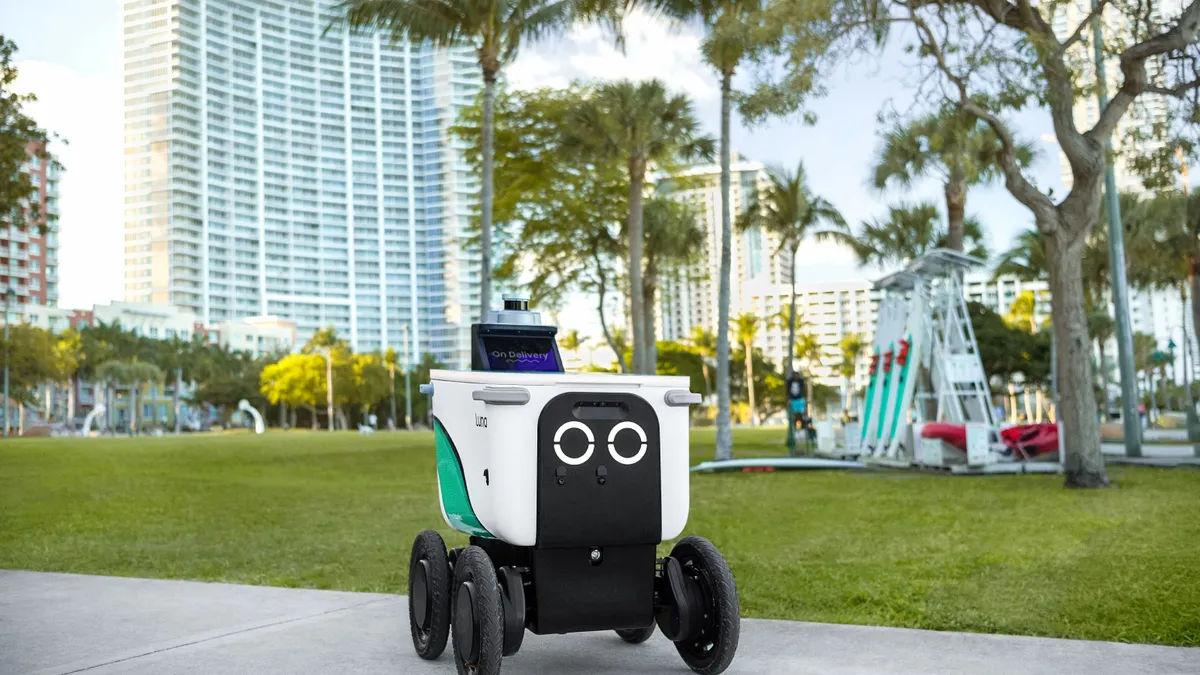Editor's note: This story is part of the Smart Cities Dive Outlook on 2021, a series on the trends that will shape the industry in 2021. For a look at the business trends affecting other industries, see the Dive Outlook on 2021.
The start of a new year can serve as an opportunity to reinvigorate local governments. As some cities dive into new fiscal budgets, others undergo yearly planning — and this year, all cities are bracing for a fresh start under the Biden-Harris presidential administration.
The turn of the calendar also signals the time for CES, an annual showcase of technological and forward-looking innovation. On the heels of the all-digital CES 2021, Smart Cities Dive has identified six core trends that experts said are expected to influence the smart city space in the year ahead.
1. Personally-owned electric bikes will continue to grow in popularity
Cities saw a surge in cycling at the onset of the COVID-19 pandemic in 2020, as residents and commuters actively avoided public transit due to health concerns. Bike sales skyrocketed to nearly 75% over 2019 numbers, and experts predict that demand — particularly for electric bikes — will continue in 2021.
As cities increasingly prioritize transportation electrification, the electric bike market is bracing for a boom. In 2019, 3.7 million e-bikes sold globally, with a trajectory to reach 10 million annual sales by 2024, Forbes reports. In fact, the Consumer Technology Association (CTA), which oversees the production of CES, included electric bikes in its annual trends forecast for the first time this year.
A number of smart city vendors are also racing to provide the infrastructure and resources needed to support an urban e-bike boom. Atlanta-based startup Parkent Cycles, for instance, has developed e-bike charging and parking stations to alleviate riders’ range anxiety, while a pair of micromobility vets recently launched Ridepanda, an online marketplace for e-bikes and other forms of personal, electric mobility.
2. Businesses will increasingly embrace 5G
The coronavirus pandemic could have wreaked havoc on a 5G rollout, but with the technology becoming more prevalent, experts say businesses will increasingly embrace its impacts.
A recent Accenture survey of corporate executives found that 8 out of 10 believe 5G will have a "significant effect on their business," while 57% think it’ll be “revolutionary," said CEO Julie Sweet during a CES panel discussion.
Sweet said 5G will change areas like manufacturing and supply chains, and businesses must quickly embrace that change or else they face being left behind. Before COVID-19, many businesses thought there would be a “much slower rise” in 5G adoption, Sweet said, but now, she warned that anyone behind the adoption curve is “missing something.”
“What’s interesting is that 5G has started with the consumer. We’re in the first wave and around the world you’ve got people using it with their smartphones. But we’re now in the wave that will really be driven by business.”
3. Cities will keep using data dashboards to share information
Even the most technologically apt cities struggled in 2020 to keep up with demands to quickly and widely disseminate COVID-19 information. Communication strategies largely centered on press conferences and creative uses of social media, while references to public data dashboards became increasingly common.
Data dashboards can “give citizens access to up-to-the-minute health info and other data relevant to monitoring for health conditions, all on your smart device,” said Lesley Rorhbaugh, director of research at CTA, during a CES trends session. As communities continue to operate remotely in 2021, it’s likely that cities will increasingly explore the personalized development of data dashboards to support advanced communications — both during and beyond the pandemic.
4. More sectors will explore “as-a-service” offerings
Companies are increasingly turning to the “as-a-service” model for their offerings in a bid to ease customers’ use, and at CES, General Motors (GM) unveiled such plans for electric vehicle (EV) ownership.
GM’s new platform Ultifi gives owners a unique ID number and allows them to set preferences on their EV, book services, delivers software updates, and offers personalization like streaming services and other apps.
GM’s Chief EV Officer Travis Hester said Ultifi promises a "more personal EV experience, putting you in control" on a single, unified platform.
"We want to reimagine the whole concept of vehicle ownership and driving," Hester said.
That effort is in keeping with other moves towards “as-a-service” offerings, with Mobility-as-a-Service (MaaS) expected to be crucial in the near term as cities look to more efficiently move people and goods, while Energy Efficiency-as-a-Service (EEaaS) could accelerate as building owners look for cost-effective ways to reduce emissions.
5. Deliveries will be increasingly autonomous
The pandemic has spurred an influx of autonomous delivery technologies, particularly as local governments and private companies experiment with contactless delivery options.
In fact, a recent CTA survey found that 26% of consumers now view autonomous delivery technology more favorably than they did before the pandemic. And the California Department of Motor Vehicles recently issued the state’s first autonomous vehicle (AV) deployment permit, which will allow Nuro to launch a driverless delivery business in the San Francisco Bay Area.
The pandemic has emphasized how big a business opportunity there is for autonomous deliveries, Aurora Director of Partner Product and Programs Lia Theodosiou-Pisanelli said during a CES panel discussion. That opportunity is only going to increase with time, even as more people get vaccinated and as the state of the pandemic improves, according to Theodosiou-Pisanelli.
6. The public will weigh-in on more smart city tech
Industry leaders will likely continue to seek public feedback on new smart city offerings, especially as public awareness continues to grow around certain advanced technologies.
Waymo is one such company that has sought public feedback for its advanced driving technology, launching its robo-tax ride hailing service to the public in Phoenix this fall.
And the federal government recently released a notice requesting public feedback for its automated driving systems framework, which will be a key part of the “path to the future” for the regulation of the technology, said Finch Fulton, deputy assistant secretary for policy at the U.S. Department of Transportation, during a CES panel.



















